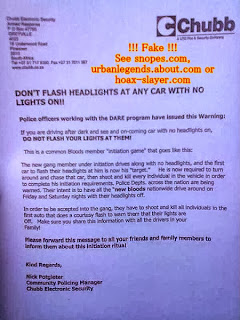It has happened again.
Every couple of weeks or so, facebook brings me a warning -- sent by a friend or family member -- and I am told to share this with everyone I know, as soon as I can.
Inevitably, the message is a hoax. Whether it's a dire warning about some facebook privacy setting, or the decades-old rumor that flashing your headlights might get you killed by gang members, it's always passed along by well-intentioned people who truly are worried (maybe even scared) that someone out there is going to do bad things to them. And, because they have seen the warning, they feel more worried and more scared and they want to help others by spreading the warning.
The thing is, these scare stories are false. So, what to do? What's the etiquette when you see one of these things and you are pretty darn sure they are false? Here's what I've taken to doing.
First, confirm that the story is a hoax. The best way to start on this task is to go to snopes.com, urbanlegends.about.com, hoax-slayer.com or any one of a set of well-researched sites and use their search engine with some key words. In fact, it's typically a faster task if you use a key phrase in the warning. For example, the most recent "flashing headlights" warning was an image, with a letterhead from Chubb Security. This hoax almost always involves a story about a gang initiation, so including "Chubb" and "gang initiation" along with "flashing headlights" quickly finds the refuting articles.
http://www.snopes.com/crime/gangs/lightsout.asp
http://urbanlegends.about.com/od/crime/a/headlights.htm
http://www.hoax-slayer.com/flash-lights-hoax.shtml
urbanlegends and hoax-slayer even have the exact image being forwarded around facebook.
Second, search a couple of legitimate news sites with key words, to be sure something new has not popped up in the news that you might have missed. I checked with msnbc.com, foxnews.com and standard.co.uk and found only one article related to the search "flash headlights gang" and that was about a scheme where people are trying to get insurance money. In any case, three news sources have nothing on the topic, so it's not likely happening.
Third, break the news nicely. I honestly believe that the people who are sending these items via facebook or e-mail are genuinely trying to do the right thing. They are trying to help. So, I try to let them know that, happily, they don't have anything to worry about. I typically respond with something like "I'm glad to report that, while I have heard this, too, it is false. It's a hoax. This is not something to worry about."
Finally, provide supporting evidence. I post or send one or two links to articles which clearly refute the hoax, and in particular I like to send links which have a large number of references.
It is my hope that people who react so quickly with fear will condition themselves to check before they post. Instead of immediately reacting with fear, they would be well served to go to the debunking sites themselves. This will ease their concerns, help them avoid perpetuating the hoax, and hopefully give them tools for making their world a less scary place.
Anyway, that's what I try to do. Thoughts? Opinions? Other ideas? Let me know.

No comments:
Post a Comment